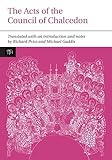The acts of the Council of Chalcedon/ translated with introduction and notes by Richard Price and Michael Gaddis Volume 1
Series: Translated texts for historians ; v. 452007 Liverpool : Liverpool University Press,Edition: Reprinted with minor correctionsDescription: 3 v. : maps ; 22 cm ; 365 pagesISBN:- 9781846311000
- 1846311004
| Item type | Current library | Collection | Call number | Status | Notes | Date due | Barcode | |
|---|---|---|---|---|---|---|---|---|
 Book
Book
|
St Cyril's Theological Library | Doctrinal theology | 262.514/AC V.I (Browse shelf(Opens below)) | Available | Volume 1 | 01049 |
Repr. with minor corrections in 2007.
Translated from the Ancient Greek.
Includes bibliographical references and indexes.
v. 1. General introduction; documents before the Council; Session I
v. 2. Sessions II-X; Session on Carosus and Dorotheus; Session on Photius and Eustathius; Session on Domnus
v. 3. Sessions XI-XVI; documents after the Council; appendices; glossary; bibliography; maps; indices.
The Council of Chalcedon in 451 was a defining moment in the Christological controversies that tore apart the churches of the Eastern Roman Empire in the fifth and sixth centuries. Theological division, political rivalry and sectarian violence combined to produce what ultimately became separate Chalcedonian and non-Chalcedonian churches, a schism that persists to this day. Whether seen as a milestone in the development of orthodox doctrine or as a divisive and misguided cause of schism, Chalcedon is chiefly remembered for its Definition of Faith, a classic expression of Christian belief in Chr.
Original version 2005
English



